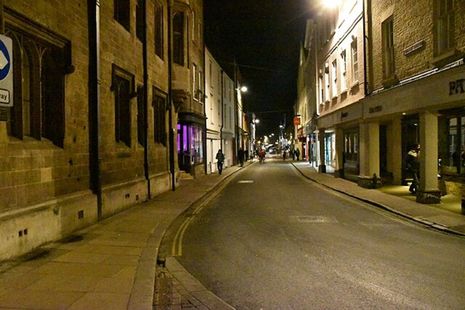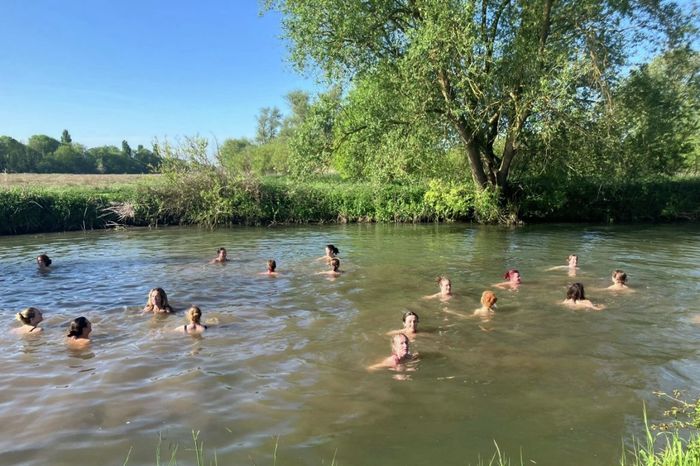3am in Cambridge: students, stillness and safety
Mimi Ronson speaks to self-professed late-night walkers, to discover what’s left when the crowds disappear

Cambridge. A city of bustle. 8.1 million visitors every year flood the streets from King’s Parade to the Prince Regent. The sun’s beating down; the streets are heaving, everywhere is filled with the sounds and scents of a vibrant, living city. But after midnight, when the tourists leave, when the students traipse home with their books or their clothes sodden with post-exam spray, what’s left in this near-silent space beyond the Skiki hubbub?
In daylight, the city performs: whether for tourists, for commerce, for the weight of its reputation. Branded tote bags shuffle past historic gates, punters line the riverbank promising “authentic” experiences, and students dash between lectures and Caffè Nero queues. But after dark, this performativity vanishes. Devoid of its audience, the city becomes oddly private – no longer staging its grandeur, but offering it quietly to those still awake.
“the city’s architecture and layered history seem to rise more vividly in the stillness”
Who wanders the street at these times? Beyond the foxes, shuffling through discarded Gail’s bagels, and the tumbleweed of litter and cigarette ends, some students are still out. But not all are en-route to Spoons: they’re just walking. Florence, Charlotte and Kevin are self-professed late-night walkers and have experienced this city in its small hours. Charlotte confesses she would walk late “because I was awake due to work stress,” and because, in comparison to the somewhat-stifling nature of daylight academia, the streets at these times felt “quite serene”. Florence agrees, finding a walk down King’s Parade in the early hours “peaceful”. The noiseless expanse of it all seems to fine-tune our senses, alerting us to the unique spectacles of nighttime, such as “photographers filming an Eagle flying” that Kevin notes on his walks.
Cambridge at night feels paradoxically both fleeting and enduring. In the absence of its usual student bustle, the city takes on a different character – one that Florence describes as carrying “a strong sense of timelessness,” usually drowned out by the capitalistic hum of daytime. Charlotte adds that, without the sparse scatterings of students in gowns heading back from formals, Camcard in hand, “Cambridge would be essentially an empty shell,” save for the odd late-night worker or porter. And yet, even in these quieter moments, Kevin reflects, “it never feels like a lonely city”. Not because of human company, but because the city’s architecture and layered history seem to rise more vividly in the stillness.
There’s a comfort to be had in these quiet hours. Florence, walking along King’s Parade, can hear for the first time “the ticking of the Corpus Clock” which, on a 2am return-trip from a neighbouring college “echoes down the street” with no blanket of tourists as a barrier. Beyond the playground that the city centre can often feel like for tourists and students during the day, Charlotte feels there’s something to be said for the “reassuring” lull of the early hours, a welcomingly “desolate” space that reminds us that we live in a real city, one with an urban edge that lies dormant beneath the wonderful architectural façades.
“In these early hours, [Cambridge] is perhaps the closest to how the city was 200 years ago”
But even this freedom has its inhibitors. During the day, the presence of others offers visibility and safety in numbers. When the streets are quieter, however, our female late-night walkers become more attuned to the few people they do come across in Cambridge after dark. For Florence, Market Square becomes “quite an edgy place” late on a Friday or Saturday night. Nevertheless, just a 20 second walk further, the area around Senate House is safe and desolate. Charlotte tells me that she’s acutely aware of anyone whose intentions she can’t “immediately read”, reminding her that the mere presence of other late-night walkers doesn’t automatically create a sense of safety.
It’s a feeling I recognise too, one that underscores how unpredictable the night can sometimes feel. The noise in the centre in those early-hours feels largely contained, encapsulated within clubs and bars in a small radius of one another; there’s a tension between the serenity that I enjoy in these moments and the natural risk that asserts its presence. But for me, this urban stillness is a welcome respite from the intensity of the Cambridge life, and offers insight to the rare nature of our academic home-from-home.
“It is rare to see such busy streets suddenly rendered barren after 10pm”, Charlotte says, and this rarity becomes its unique charm. There’s something “quite ethereal,” Florence adds, about the transition of Cambridge from daytime hotspot to nighttime ghost town. “In these early hours, it is perhaps the closest to how the city was 200 years ago. And I always find something quite ethereal in that”.
Perhaps it’s only as students that we get to see this version of the city–the rare moment where the grandeur belongs only to us, without having to perform for it. In the silence, Cambridge doesn’t demand anything. It simply exists. And for a brief walk, so do we.
 News / Judge Business School advisor resigns over Epstein and Andrew links18 February 2026
News / Judge Business School advisor resigns over Epstein and Andrew links18 February 2026 News / Hundreds of Cambridge academics demand vote on fate of vet course20 February 2026
News / Hundreds of Cambridge academics demand vote on fate of vet course20 February 2026 News / Petition demands University reverse decision on vegan menu20 February 2026
News / Petition demands University reverse decision on vegan menu20 February 2026 News / CUCA members attend Reform rally in London20 February 2026
News / CUCA members attend Reform rally in London20 February 2026 News / Gov grants £36m to Cambridge supercomputer17 February 2026
News / Gov grants £36m to Cambridge supercomputer17 February 2026










